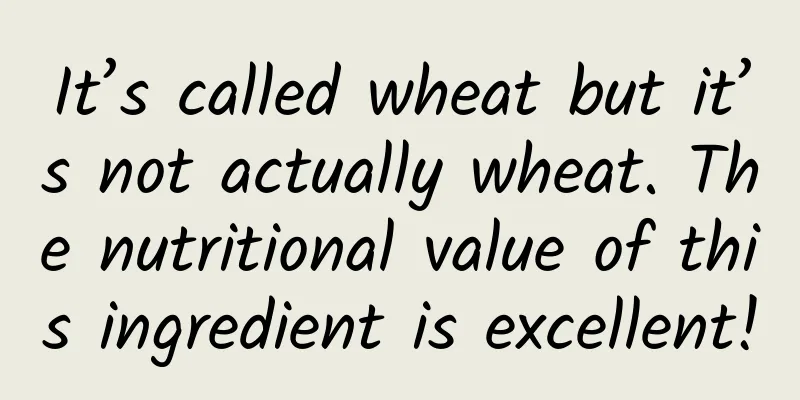Digging up the roots | The latest research proves that "eating lard may be beneficial to cardiovascular health in the elderly"? Scientific data cannot be interpreted in this way

|
gossip "Which is healthier, vegetable oil or animal oil?" has always been a controversial topic. There are many statements on the Internet that "vegetable oil is healthier than lard." However, there are also many lard lovers who believe that "lard is more delicious and healthier than vegetable oil, and lard rice is a happy childhood memory." Therefore, whenever the term "justify saturated fat/pork" appears, it will attract a lot of attention. Recently, Henan University of Traditional Chinese Medicine published an epidemiological survey in the medical journal Current Problems in Cardiology, which concluded that " for Chinese elderly people, cooking with animal fats such as lard (rich in saturated fat) is more beneficial to cardiovascular health, while using vegetable oils may be harmful ." This conclusion means that eating lard is not only harmless to health, but beneficial, which is naturally welcomed by many people. Screenshot of the paper analyze Although this paper was published in a standard academic journal and the data source is relatively reliable, I believe that it is still very imprecise to draw such a conclusion from the survey data. What exactly is this research about? This paper is an analysis of existing data, which comes from the "Tracking Survey on Factors Affecting the Health of the Elderly in China" organized by Peking University. A total of 15,242 Chinese elderly people (minimum age 65 years old)'s dietary structure and health data in 2018 were included in the final analysis. Among these people, 1,533 people (average age 85.90 years) mainly used animal oil for cooking, and 13,709 people (average age 84.47 years) mainly used vegetable oil. Among those who ate animal oil, 249 people developed atherosclerotic cardiovascular disease (ASCVD), while 3,918 people ate vegetable oil, with a ratio of 16.2% and 28.6% respectively. According to the data, the incidence of cardiovascular disease in the elderly who eat vegetable oil is much higher! However, data from epidemiological surveys often contain "statistical traps". The data themselves only indicate that there is a "correlation" between them - in order to draw a "causal relationship" between them, more in-depth analysis and other evidence are needed. What to think of this study First of all, this is a "cross-sectional study". Specifically, at a certain point in time (this study was conducted in 1998), we collected various information from many people in different places, and then statistically analyzed the relationship between these information. In other words, for each sample, it is only the information at this specific point in time, and there is no information before or after. For example, a person who switched from animal oil to vegetable oil because of an illness and a person who got sick after eating vegetable oil for many years are not distinguished in such a study. Copyrighted stock images, no reproduction is authorized In fact, compared with the elderly who mainly eat animal oils, the elderly who mainly eat vegetable oils have the following characteristics: 1. Higher education level; 2. A higher proportion of married people; 3. A higher proportion of people who exercise regularly; 4. The proportion of households with an annual income of more than 300,000 yuan is higher; 5. The current smoking and drinking rates are lower; 6. Higher rates of overweight and obesity; 7. The proportion of people who eat rice as their staple food is lower; 8. A higher proportion of people consume fresh fruits and vegetables every day; 9. Meat consumption is lower; 10. The proportion of hypertension is slightly higher; 11. A higher rate of type 2 diabetes; 12. A higher proportion of high cholesterol; 13. The proportion in rural areas is even lower; 14. People who eat animal oils are mostly from the South/Southeast. Among these factors, 3, 5, 8, and 9 should be beneficial to cardiovascular health, while 1, 4, and 13 are associated with better living and medical conditions. It is surprising that people with these "favorable factors" have a higher incidence of cardiovascular disease. After the researchers "eliminated" the influence of these factors through statistical tools, the incidence of cardiovascular disease in people who eat vegetable oils is still higher than that in people who eat animal oils, which seems to be "conclusive evidence." However, we need to note that the so-called "eliminating the influence of confounding factors" is mainly a "numbers game" and does not mean that the influence of these factors can be completely eliminated, nor does it mean that the listed factors cover all influencing factors. For example: ▶ People who have eaten animal oil for many years and switched to vegetable oil because of a high risk of cardiovascular disease or have already suffered from cardiovascular disease (because of the nutritional guideline that "vegetable oil is more beneficial to cardiovascular health"); ▶ The study only considers whether the oil is vegetable oil or animal oil, but not the amount of oil consumed, which is unreasonable. For example, the difference between eating 80 grams of oil and 40 grams of oil per day may mask the impact of "animal oil or vegetable oil"; ▶ Animal oil and vegetable oil are only one factor in the dietary structure. In addition to the three factors considered in the study, namely "meat consumption", "fresh fruits and vegetables" and "staple food", are they accompanied by differences in other nutritional factors (such as total calories, dietary fiber, free sugars, etc.)? ▶ Other possible factors not considered In fact, among the 15 "population characteristics" involved in this study (the above 14 parameters plus the consumption of "vegetable oil/animal oil"), if we randomly pick two and make correlations, we can get many "subversive" results, such as: 3 and 6, that “people who exercise regularly are more likely to be overweight and obese”; 4 and 11, which are “People with high family income are more likely to suffer from type 2 diabetes”; 8 and 12, "Eating fresh fruits and vegetables every day is more likely to cause high cholesterol" … The data are still the same, but because of the different interpretation angles, these absurd conclusions can be read out. This only shows that the data of epidemiological surveys themselves do not produce conclusions, and how to interpret them is the key to whether the conclusions are reliable. Copyrighted stock images, no reproduction is authorized In short, this study targeted a population with huge differences in regions (meaning genetic and environmental factors, etc.), living conditions, health status, etc., and associated one factor in the diet structure (animal oil or food oil) with a health endpoint (cardiovascular disease incidence) with many health influencing factors, and then used the former as the "cause" of the latter. Although the data source may not be a problem, it is far from sufficient to establish a "causal relationship" between the two. Other studies that “vindicate lard” In fact, this is not the first report to "vindicate lard". For example, the British BBC released a "nutritious food ranking list" and lard ranked 8th. This made many lard lovers very happy, and this ranking was widely circulated with the image of "reversal of scientific conclusions", "slapping nutrition experts in the face" and "vindicating lard". The BBC is not an academic institution or a food and drug regulatory agency, it is just a media. The "Nutritional Food Ranking" it publishes does not have any scientific authority. Of course, the basis of that ranking is not the nutritional content or nutritional value of various foods, but based on an evaluation method. This method was published in PLOS ONE. It uses the food composition database of the US Department of Agriculture and the human body's demand for various nutrients to meet the human body's needs through a combination of different foods. PLOS ONE screenshots The so-called ranking of "more than 1,000 kinds of food" is actually to use more than 1,000 kinds of food in different combinations, with the goal of using as few kinds of food as possible to meet the needs of the human body. Of course, there are many such combinations, and the same food may appear in different combinations. Researchers believe that if a food appears in more combinations, it means that it is more capable of meeting human needs with other foods, which means that it is "richer in nutrients." This "richness" is understood as "high nutritional value." This evaluation method can be self-consistent, but being self-consistent does not mean that its results are reasonable and meaningful. For example, among the 1,000 foods that can be selected for combination, the flavor, taste, price, and availability of each food vary greatly. If a "suitable combination" food is not available, then the combination containing it must be re-combined, and the entire result may change. For example, according to the ranking obtained by this evaluation, parsley, flounder, chia seeds, etc. rank higher than lard. There are thousands of food combinations containing them, and all the combinations based on the ranking are only 20,000. For Chinese people, these three foods are rare. If these three are removed from the 1,000 foods, it will hardly change the food composition of the Chinese population, then there will be thousands of combinations that need to be redone, and the ranking will be completely different. In other words, this evaluation method is nothing more than a data game. The researchers set a set of rules and ranked the foods according to these rules, and then the BBC published the results of this ranking as the "Healthy Food Ranking". Because some of the results of this ranking are different from people's established cognition, it has attracted great attention. The unreasonableness of this set of rules was ignored by those who published and disseminated them. In short, the "scientific basis" of the "nutritional food ranking" published by the BBC is not reasonable, and the ranking has no practical value. Copyrighted stock images, no reproduction is authorized in conclusion Lard is a kind of edible oil. The key to the impact of edible oil on health is its fat composition. Based on a large amount of research data, the current dietary guidelines of countries around the world recommend that: while controlling the total amount of fat intake, try to reduce the intake of saturated fat. Compared with common vegetable oils (except palm oil and coconut oil), lard has much higher saturated fat, but less than butter and mutton. Considering the flavor appeal of lard, it is no big problem for people who like it to eat a small amount, but it is unreliable to think that it is "good for the cardiovascular health of the elderly" or even "good for health". Author: Yun Wuxin, PhD in Food Engineering, Science Writer Reviewer: Zhu Huilian, Professor of the Department of Nutrition, School of Public Health, Sun Yat-sen University The article is produced by Science Refutes Rumors. Please indicate the source when reprinting. The cover image and images within this article are from the copyright gallery. Reprinting and quoting them may lead to copyright disputes. |
<<: What is quantum artificial intelligence? (Part 1)
>>: The world's deepest underground laboratory has made important progress!
Recommend
"Tencent Classroom" product operation analysis!
Due to the epidemic in the first half of this yea...
iOS15 has just been released, but iOS16 has already been revealed? Is this Apple's most perfect system?
There is an iron rule in the digital market: once...
Is the investment cost of Ezhou Finance Mini Program high? Ezhou Finance Mini Program Investment Fees and Process
The advantages of WeChat mini program investment ...
Why do roosters crow in the morning?
"The lights are on at midnight and the cocks...
From King of Glory, I summarized the three major operating magic weapons of Tencent Games
Two things happened recently. First, more than ha...
E Source: Research shows that battery costs will soar 22% by 2026, and electric car prices may increase by $3,000
According to foreign media reports, a new report ...
How do businesses manage live streaming traffic and conversions?
Today, in our concept, live streaming has basical...
10 secrets of why iPhone is so expensive, let Apple continue to fly for a while
Apple's biggest adventure was completed last ...
Watching 300 Douyin videos a day made me rethink Toutiao
Douyin has become a hot commodity. Compared with ...
These on the sea surface will destroy the marine food chain! (Not white garbage)
Today is World Oceans Day 2022. Let us protect th...
Sun Jingwei's secret body sculpture: Recreating the vest line
Sun Jingwei's secret body sculpture: Recreati...
Planning and creating popular notes on Xiaohongshu!
As one of the social platforms, Xiaohongshu has n...
“Double-peak La Niña” is coming, will you be frozen to tears this winter?
From November 4 to 8, my country just experienced...
Electric Technology Car News: Volvo S90 has a heavy responsibility to compete with BMW, Mercedes-Benz and Audi, but its sales are dismal. How can it turn around?
For medium and large sedans, except for some pers...
Baidu Marketing 618 Delivery Guide and Plan
618 is coming and the battle is about to begin. H...









